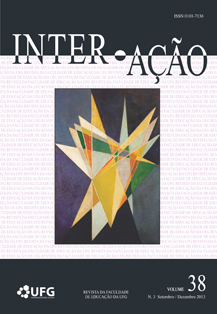A TEORIA DAS REPRESENTAÇÕES SOCIAIS: UM ESBOÇO SOBRE UM CAMINHO TEÓRICO-METODOLÓGICO NO CAMPO DA PESQUISA EM EDUCAÇÃO
DOI :
https://doi.org/10.5216/ia.v38i3.19593Mots-clés :
Teoria das Representações Sociais, Educação, Caminhos Teórico-Metodológicos.Résumé
A Teoria das Representações Sociais (TRS) tem influenciado a área educacional, já que esta atualmente está mais aberta a novas teorias, em processo de rompimento com o paradigma da modernidade e tem produzido estudos em que a Representação Social ganha relevo. Objetivou-se, neste artigo, desenvolver os caminhos teórico-metodológicos que sustentam uma pesquisa de doutorado na área de educação a partir da leitura/do estudo de autores seguidores de Serge Moscovici, criador da referida Teoria, interessado pela produção cotidiana do senso comum e pela infiltração da produção científica nesse tipo de conhecimento. Reconheceu-se, na TRS, um largo passo para a compreensão da realidade na fruição com o senso comum, e o cotidiano escolar é um espaço relevante de estudo para esse referencial.
Téléchargements
Téléchargements
Publié-e
Comment citer
Numéro
Rubrique
Licence
A Inter-Ação utiliza como base para transferência de direitos a licença Creative Commons Attribution 4.0 para periódicos de acesso aberto (Open Archives Iniciative - OAI). Por acesso aberto entende-se a disponibilização gratuita na Internet, para que os usuários possam ler, baixar, copiar, distribuir, imprimir, pesquisar ou referenciar o texto integral dos documentos, processá-los para indexação, utilizá-los como dados de entrada de programas para softwares, ou usá-los para qualquer outro propósito legal, sem barreira financeira, legal ou técnica.
Autores que publicam neste periódico concordam com os seguintes termos:
1) Autores mantém os direitos autorais e concedem à revista o direito de primeira publicação, com o trabalho simultaneamente licenciado sob a Licença Creative Commons Attribution que permite o compartilhamento do trabalho com reconhecimento da autoria e publicação inicial nesta revista.
2) Autores têm autorização para assumir contratos adicionais separadamente, para distribuição não-exclusiva da versão do trabalho publicada nesta revista (ex.: publicar em repositório institucional ou como capítulo de livro), com reconhecimento de autoria e publicação inicial nesta revista.
3) Autores têm permissão e são estimulados a publicar e distribuir seu trabalho online (ex.: em repositórios institucionais ou na sua página pessoal) a qualquer ponto antes ou durante o processo editorial, já que isso pode gerar alterações produtivas, bem como aumentar o impacto e a citação do trabalho publicado.















